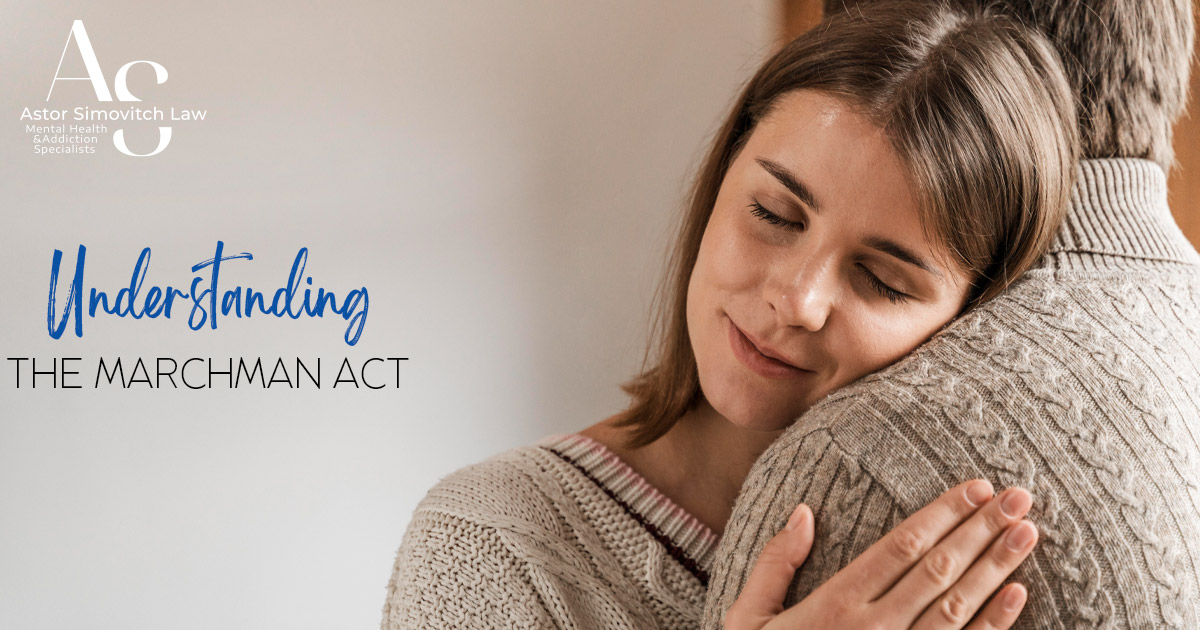Understanding The Marchman Act

The Marchman Act is a central part of Florida’s public health framework for supporting those with substance abuse disorders. It creates a legal mechanism for compelling a person who is struggling with addiction to undergo involuntary assessment and stabilization, and if necessary, involuntary treatment for a substance abuse disorder. However, the Act’s purpose and processes are frequently misunderstood. In this article, we unpack the Marchman Act’s key provisions, explain how it can be used to help loved ones struggling with addiction, and address some common misconceptions about the Act.
What Role Does The Marchman Act Play In Florida’s Mental Health And Substance Abuse Law?
The Marchman Act is one of several pieces of legislation passed by the Florida legislature to ensure that families with a loved one who is suffering with a substance use disorder can access the treatment they need. In this sense, it can be contrasted with the Baker Act, which exclusively provides legal interventions for those dealing with severe mental illness. The Baker Act, unlike the Marchman Act, is not a treatment statute, and is not a long term solution. It is, at best, a band aid for emergency use only. Consulting with an experienced Marchman Act attorney can help you decide on the appropriate course of action.

Key Provisions Of The Marchman Act
Before the Hal. S. Marchman Alcohol and Other Drug Services Act was passed in 1993, the legal framework for helping those with addiction was outdated and inadequate. The Marchman Act seeks to address this issue by providing clear standards and processes for substance abuse interventions. There are two main interventions that the Act creates: first, the involuntary assessment of a person with a suspected substance abuse disorder; and second, the involuntary treatment of a person who is found to have a substance abuse disorder after being assessed.
Involuntary Assessment And Stabilization
There are four ‘routes’ for initiating involuntary assessment under the Marchman Act. The route we’ll discuss here is the one used most commonly by families attempting to get their loved ones struggling with addiction into treatment and is the only route that is initiated by a filing with the court. The others are the initiation of involuntary assessment by a law enforcement official, and the emergency initiation of involuntary assessment by a qualified professional such as a physician.
For a court to grant an order requiring that a person be taken into custody and delivered to a licensed treatment facility for assessment and stabilization, a petition for involuntary treatment services must be filed by someone who knows the person’s substance abuse issues (this could be a spouse, parent, child, sibling, friend or any other concerned person). This petition must meet certain criteria, to be successful. The petition must demonstrate to the court that there is reason to believe that the person who is the subject of the proceedings (the ‘respondent’) is impaired due to substance abuse, and because of this:
- They have lost the power of self-control with respect to their addiction;
- They are unable to appreciate that they require treatment, or have refused to enter treatment voluntarily; or
- They have or have threatened to inflict physical harm on themselves or others.
Clear and compelling evidence must be included in the petition to prove that these criteria have been met. If a request for an emergency order for assessment and stabilization is not granted, the Court will then schedule a hearing at which the respondent must be present. If the petition is granted, the respondent will be taken to a treatment center for assessment (if necessary, they may first be taken to a hospital for emergency medical treatment).
If you intend to bring a petition for the involuntary assessment of your loved one, the assistance of a reputable attorney is indispensable: they will prepare your petition, collate relevant evidence, and represent you in court, giving your petition the best possible chances of success.

Involuntary Treatment
Once a person has been taken to a treatment center for assessment, they can be held anywhere from seventy-two (72) hours, until the time of the treatment services hearing. They will be assessed by a qualified professional and given any medical interventions necessary to stabilize their condition. If the qualified professional finds that the person has a substance abuse disorder, the second key mechanism created by the Marchman Act will come into play: involuntary treatment.
A treatment services hearing will then be conducted, at which time the court will take testimony from the qualified professional and other witnesses and consider all other relevant evidence (such as before ordering that a person be admitted for involuntary treatment.
Common Misconceptions About The Marchman Act
Though the Marchman Act has been a part of Florida law for over thirty years, several misconceptions about its role and processes persist in public discourse.
The Marchman Act is a type of criminal intervention
The first misconception is that Marchman Act proceedings are criminal proceedings. This is entirely incorrect: though a law enforcement officer may be involved in taking someone with a substance abuse disorder into custody for involuntary assessment, this is not the same thing as an arrest. One of the purposes of the Act is to help destigmatize and decriminalize substance abuse disorders so that people can get the help they need to recover from addiction – the Act should not be thought of as a form of criminal punishment.
The Marchman Act allows for forced treatment
A second common misconception is that the Marchman Act can be used to make a family member undergo a ‘forced detox’. If a person is ordered to undergo involuntary treatment by a court, they are required to remain in the treatment facility in terms of the court order. Because the court can sanction the respondent for failing to follow the court order, this is a strong incentive for someone to stay in treatment.
The Marchman Act is used in drug addiction cases only
A third misconception is that Marchman Act interventions can only be used for those with an addiction related to “street” drugs such as marijuana, cocaine, meth, and/or heroin. This is not the case: the Act can be used in any case where a person is impaired due to substance abuse, and this includes alcohol dependency, alcoholism, and prescription medications.
Consult With An Attorney You Can Trust
If your loved one has a substance abuse issue and is refusing treatment, you must act quickly to explore your legal options and get them the help they need.
Consulting with an experienced attorney will help you to evaluate your loved one’s circumstances and decide on the best path forward.
At Astor Simovitch Law, we represent families in Marchman Act proceedings and have years of experience in developing targeted interventions that give people with substance abuse issues the best possible chance of experiencing the miracle of recovery.
To arrange a consultation or find out more about our legal services, give us a call today at 561-419-6095.